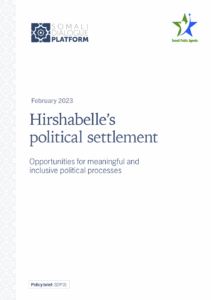Overview: Hirshabelle’s volatile political settlement
Hirshabelle has been the site of continued political instability since its hasty formation as a Federal Member State (FMS) in October 2016, combining the two regions of Hiiraan and Middle Shabelle. Throughout the process, key constituencies in Hiiraan argued that the region should be a separate FMS rather than be forced to merge with Middle Shabelle. Issues also arose around representation, with clans in both regions demanding more seats. Despite these challenges, in late 2016 the Federal Government of Somalia (FGS) hurriedly formed Hirshabelle state to allow federal elections to go ahead.
This rushed, top-down and exclusionary approach left the state divided and dysfunctional. Not only was the FMS administration incapable of collecting revenues from the two regions, but key constituencies in Hiiraan claimed they no longer recognized Hirshabelle state. Tensions were further aggravated by the election of Ali Abdullahi Hussein ‘Guudlaawe’ of the Abgal clan to the state presidency in November 2020, with Jowhar, the regional capital of Middle Shabelle, remaining the state capital. This was seen by some, but not all, communities as breaching a previous gentlemen agreement allocating the presidency to the Hawadle clan, who reside mostly in Hiiraan.
These political tensions have overlapped with the regular mobilization of armed forces, especially around the most recent election crisis. In late 2020, Abukar Warsame ‘Xuud’, a former military general, mobilized a militia on the outskirts of Beledweyne under the banner of the Hiiraan Rescue Council and demanded a separate FMS for Hiiraan. The militia declared that Hirshabelle officials would not be allowed to enter Hiiraan’s capital, Beledweyne, delaying President Guudlaawe’s inauguration, until 26 February 2022, after the FGS deployed forces there.
These unstable dynamics have rendered the state government dysfunctional, hindering any prospect of development and good governance in Hirshabelle. Such dynamics arise from the absence of a sustainable and inclusive political settlement in the state—that is, a shared understanding of and commitment to the exercise of power, in which political actors share a basic agreement on which institutions hold what power, and how these powers can be peacefully contested. While it is clear that Hirshabelle’s political actors remain deeply divided over such questions, the new military campaigns ongoing in the state, once concluded, may create an opportunity to establish stronger political fundamentals. This policy brief, based on extensive empirical research, therefore provides an overview of the contentious issues at play before outlining a possible framework for transforming of the political settlement.
This report is a product of the Somali Dialogue Platform. The Somali Dialogue Platform is a programme which supports Somalis to achieve consensus on contentious political issues and is implemented by the Rift Valley Institute. The Somali Dialogue Platform is funded by the UK Foreign, Commonwealth and Development Office (FCDO), the Ministry of Foreign Affairs of Denmark, and the United States Agency for International Development (USAID).




